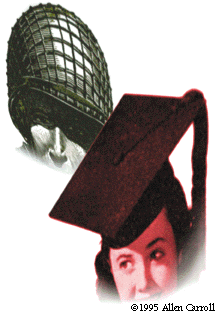 The University of Chicago Magazine August 1995
The University of Chicago Magazine August 1995

By Josette Dermody Wingo
In the Fall of 1946 the walkways on the quads were crowded with students, many wearing khaki field jackets and boots--veterans enrolling under the GI Bill. Not all veterans dressed in khaki: I wore my converted-to-civilian-wear Mainbocher Wave navy blue, its anchor-embossed buttons carefully removed and replaced, my non-regulation hair growing defiantly below my collar.
The war was over and won, and we wanted to get on with our lives. We were a focused group, matured by battle or at least by travel and time. The usual Chicago student was a teenager; we in our 20s were more than conscious of the five-year hole in our life plan and eager to make up for lost time. The professors were said to love the GIs because we added a dimension of discussion and focus to class work. Many of us had whiled away boring downtime reading in base libraries or passed hurry-up-and-wait time with the government-issue paperbacks we carried everywhere.
BiSci, SocSci, and Humanities were about what I expected, but on some mad impulse I signed up for German I, only to find the class full of veterans from the European theater who had already learned German, often with a blond dictionary. They whooshed by me, going from the sentimental, elementary Bübchen im Himmelstür to excerpts from Kant while I, with no gift for languages, struggled to construct a coherent sentence with the verb at the end. Herr Professor pushed and pulled me through to a barely passing grade, correcting me patiently in his fractured English.
He wasn't the only one with a German accent on campus. The University was a haven for many distinguished migr professors forced out of Europe. This necessitated an extra bit of concentration at lectures, especially in a large hall like Mandel, as I strained to absorb unfamiliar concepts in SocSci through a thicket of gutturals and umlauts.
The married GIs lived in the Married Students Barracks on the south side of the Midway. These quickly filled up with babies, laundry, and tricycles amid the toppling piles of books. The toddlers, each one more intelligent and promising than the next, wore identical unisex garments: corduroy overalls faded to a nondescript umber. The crowded apartments with their paper-thin walls and thrift-shop furniture overflowed with intensity and camaraderie. We had some good parties there, while the babies slept.
The married-students quarters were crowded, but they were filled with adults. The regular dorms were quite another story for the women veterans. Imagine: Rules and Regs. In loco parentis. Since some of the students were as young as 15 it probably made sense to the University, but to us worldly-wise and sophisticated twentysomethings, having the doors locked in our faces at 10 p.m. was unconscionable. We who had fought the battle of Market Street, who had stayed up toasting departing warriors at the Top of the Mark till midnight, were outraged. A former Marine colonel and I spoke out at house meetings in Green Hall and got...nowhere. Resourcefully, we moved out and into funky apartments in the neighborhood. There you would usually find us by 10 p.m.--the libraries were closed and we still had so much studying to do.
Eager as we were to get on with things, not all of the GIs were fancy-free. In those days we called Too Much War "Section Eight," and some of the guys were barely holding themselves together, although no one but Student Health made much of it. Everybody had a story to tell, but most didn't. We just knew. In the veterans' dorms like Snell Hall, people learned quickly who couldn't be woken up without risking one's life, who freaked at loud noises, who screamed in his sleep.
Plato waited patiently in the library while psychoanalysts listened. Everybody deserved at least one episode of overload, a chance for angst and histrionics. The pain of growing up--maybe it was more intense because we were older and knew it wasn't all that easy.
The University was a healing place after the war. It was healing to plunge into Thucydides and Herodotus and the wonderful, meaningful but distant Peloponnesian War; healing to occupy oneself with the Maroon; and energizing to get involved with the World Federalists or contend with the Communists--political activists who said they were concerned with making it a better world. A safer world. A world without war. It seemed possible then. Hadn't we just fought the good fight for that purpose?
There was lots and lots of talk about Ideas. Discussion of Ideas wasn't limited to Cobb Hall. There was always the University Tavern where the arguments got louder and more epistemological as the beer flowed, where the question of ontology eventually turned to the question of what shall we do with a drunken sailor. "I've got sixpence--jolly, jolly sixpence." Starlit streets rang with our songs on the way home.
We sought answers in the Great Books and found some. We sought answers in Bug House Square; we looked for transcendence at the Art Institute; we thrilled to the Rockefeller Chapel organ, and to jazz at the Blue Note. The world was a wonderful place. Some found the University so congenial they stayed for degree after degree and even became professors. Others of us moved on, still savoring our GI Bill experience.
Josette Dermody Wingo, PhB'48, lives in Santa Monica, California.Her book, Mother Was a Gunner's Mate: World War II in the Waves, has recently been published by the Naval Institute Press.